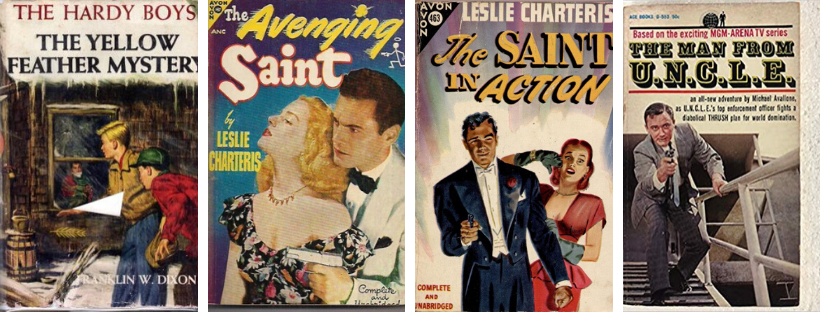Hi, Everyone – I was thinking of doing a brief blog on the authors I’ve liked and who have inspired me. I could cite great writers old (Hemingway, Steinbeck, Graham Greene, Katherine Anne Porter) and new (Ann Patchett, Ian McEwan, Charles McCarry, Louise Erdrich, Alan Furst). But I began to think it would prove pretty boring and, as worthy a topic as it might be, it’s also hard to do without giving yourself a subtle pat on the back.
I decided it would be more fun, though, to praise the trashy authors who gave me my love of reading and, whatever their shortcomings, broadened (and romanticized) my outlook on the world.
First and foremost among these would be Franklin W. Dixon, who doesn’t even exist, but is the pen name for the several anonymous ink-stained wretches who wrote the Hardy Boys mysteries. My brother, Richard, and I loved these, must have read forty of them. During long summer days we would go to the local cheap junk store, buy two of them. Each of us taking one, we would lie on a bed or the couch or the grass until, by mid-afternoon, we had finished them. Then we would surface just long enough to exchange books and go back to reading. They were quick, shallow, implausible and poorly written. I didn’t know that and didn’t care. They offered pace, action and the reassurance that you could be a great teen detective and still be home for dinner every night. My memory of these books was so great that I should have left well enough alone. Sadly, I made the mistake of reading out loud to our son my favorite of these, “The Yellow Feather Mystery.” Shouldn’t have done it. It was godawful, and with every clunky sentence in it one of childhood’s fond memories slipped away.
In middle school I took what I thought was a step upward to the now-forgotten Leslie Charteris, author of the equally-forgotten series of pulps featuring Simon Templar as The Saint. No more Hardy Boys for me. The Saint travelled the world, canoodled with beautiful women, drank like a fish and shot dead all kinds of bad guys in his self-appointed role as modern-day Robin Hood. I suppose I read twenty of them, maybe more. I think they were what inspired me to start writing down all the foreign and exotic places I had traveled to in the pages of books, not imagining I would ever get any closer to them than that. They also game me the first vague notions that I’d love to be a sophisticated man of the world—an act that could be badly misunderstood in Tigard, Oregon in the 60s.
About this time, I was also reading a series of Man From U.N.C.L.E. books. Written by various cherished hacks and based on the hit TV series, they came out at a rate of one every couple of months. I ate ‘em up. My thirteen year-old self thought Napoleon Solo was the coolest mensch in the world. From there, it was a quick leap to Ian Fleming and James Bond. Written in a tone which, after the Saint and the Hardy Boys, I took to be gritty realism (the books are very unlike the movies), Bond’s skills and derring-do made me think he could lay some noogies on both The Saint and Napoleon Solo, give them each a wedgie and take their lunch money. The books also had a largely-undeserved reputation for raciness which made me think I’d better hide them from my mom. I was bitterly disappointed when she found one of them tucked under the mattress of my bed, pulled it out—and laughed.
Here, we come to a melancholy pass. With Fleming and Bond I was bumping up into books that were almost well-written and had at least a passing acquaintance with the real world. In fact, it was about the time I was reading the last of them that I began to think maybe I could start reading better books by better writers.
But, like first love, I’ll never lose my affection for the hacks, drudges and scribblers who gave me so much pleasure and inspired in me the first stirrings of thinking I’d like to give a try at doing what they were doing.
And there’s still a part of me that thinks Napoleon Solo was the coolest guy in the world.
